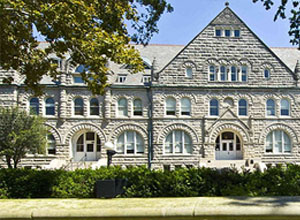 History
History
Tulane University is one of the nation’s most prestigious educational and research institutions. It was founded in 1834 as the Medical College of Louisiana in response to a yellow fever epidemic before merging with the University of Louisiana in 1847 and eventually reorganized into the private institution of Tulane University of Louisiana in 1884. Today, Tulane is served by 1,180 full-time faculty and 3,490 staff, and enrolls 13,531 undergraduate, graduate and professional students. The University’s ten schools and colleges offer undergraduate, graduate and professional degrees in the liberal arts, science and engineering, architecture, business, law, social work, medicine and public health and tropical medicine. These units provide a broad array of opportunities for education and research. The faculty compete successfully for peer-reviewed grants with sponsored research funds totaling $135 Million annually.
Tulane is a proud member of the prestigious Association of American Universities and is ranked by the Carnegie Foundation as a university with “very high research activity”, a classification shared by only 2% of more than 4,300 higher educational institutions rated by the foundation nationwide. For 2016, Tulane is ranked among the top 50 national universities by U.S. News and World Report. Tulane University is noteworthy in its combined presence and close interaction between the Schools of Medicine, Public Health and Tropical Medicine, Science and Engineering, and the Tulane National Primate Research Center and a Regional Biocontainment Laboratory. It is the only institution in the nation with this combination of institutional resources.
Tulane has nationally and internationally recognized research and training programs in infectious disease prevention and treatment; chronic diseases including cardiovascular and pulmonary disease, hypertension, kidney disease, diabetes and obesity; cancer biology and treatment innovation; maternal and child health; reducing health disparities; sustaining health and wellness; and neuroscience. The National Institutes of Health has provided long-term support for 3 Centers of Biomedical Research Excellence-COBREs (hypertension and renal biology, cancer genetics and aging); the Tulane Building Interdisciplinary Research Careers in Women’s Health (BIRCWH); the Tuberculosis Systems Biology Program; the Tuberculosis Research Unit; the Center for AIDS Research; and the Simian Vaccine Evaluation Unit.
CCTS Partnership
As a CCTS Partner, Tulane offers significant translational research and training strengths in several productive, well-funded areas, focused on the Health Sciences Center Campuses. As part of the CCTS Training Academy, they participate in the TL1 and KL2 training programs, panels, K writing club, research team training, TIERS, workshops and offer mini-sabbaticals. Significant research support in Cancer Biology and Clinical Cancer Research exist and Tulane partners with the Louisiana Public Health Institute to form a regional Electronic Medical Record Data Network funded by the Patient Centered Outcomes Research Institute to conduct clinical trials and other translational research. With core assets in clinical research, clinical research career development, molecular genetics, bioinformatics, ethics, community participation, and communication, Tulane joins the CCTS to advance innovative clinical and translational science.
Check out the new Master of Science in Clinical Research being offered by Tulane University and LSUHSC!
